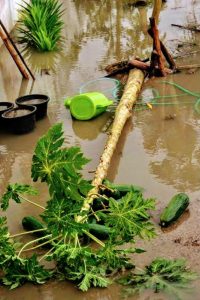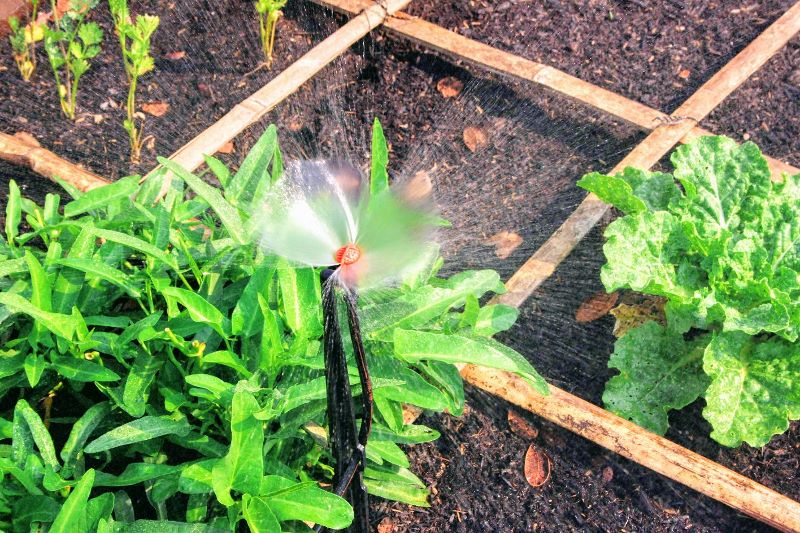Is it OK to Water Plants in the Sun?
We have all heard it said that watering plants in the middle of the day is a bad idea. The warning is usually along the lines of “Don’t water plants in full sunlight, or the leaves will burn”. This is such commonly dispensed wisdom, why would we doubt its veracity?
So, is it okay to water plants in the sun? It is perfectly fine to water plants in full sunlight. While many gardeners will claim otherwise, watering in the middle of the day will not ‘burn’ or harm your plants in any way.
A simple thought Experiment: watering in full sunlight
Assume that plants are harmed by daylight watering. If this is true, then they must really hate it when it rains. Of course this is silly!
Plants evolved on planet Earth several hundred million years ago, possibly more than 700 million years ago. Somehow they managed to survive just fine without home gardeners spreading rumors about the dangers of daylight watering.
Why do people believe it is harmful to water plants in sunlight?

The simple answer is that we often just repeat things said to us by people we trust. The origins of this belief are possibly due to the very real phenomenon known as nitrogen burn. When the available nitrogen in your soil exceeds ideal conditions for you plants, you may see distinctive discoloration in the leaves.
The existence of nitrogen burn predisposes us to accept a gardening enthusiast talking about “burn” to vaguely ring true.
Another factor at play is that we more easily remember “facts” if they are counter-intuitive. For example: “What you are telling me about water burning plants sounds so silly it must be true.”
There is also a good reason not to water the leaves of trees. When it rains, trees usually manage to drip a good proportion of the water away from the trunk. Spraying water into the canopy of a tree can make the bark moist, and if done regularly can promote disease on the tree trunk. To be safe it is best to water trees on the ground, within their natural drip zone.
When is the best time of day to water your garden?
The most efficient time to water the garden is when it is no at the hottest. Watering early in the morning or in the evening will minimize the amount of water lost to evaporation and hence maximize the water available to your plants.
There are some minor differences between watering early or late in the day. If you water in the evening, the garden will remain wet through the night which can encourage snails / slugs, and fungal pathogens to attack your plants. On the other hand, if you choose to water in the morning, you will lose more water to evaporation as the sun heats up later in the day.
In practical terms it does not matter a great deal whether you water early in the morning or late afternoon. A gardener arguing strongly for one or the other is often just expressing their preference based on sleep patterns and other lifestyle factors.
Why would I water my garden in the middle of the day?
If you live in a hot climate, spraying water on crops can play a vital role in removing field heat. Watering in the middle of the day is not generally for soaking the soil but reducing the temperature at ground level through evaporation.
Spraying your vegetable patch with a mist of water in the heat of the day is often the difference between good yield and nothing to harvest at all.
Yes, there are valid water efficiency concerns about watering during the day. On the other hand, if you allow your vegetable crop to die from heat and then buy canned vegetables imported from across the world, I do not think you should be patting yourself on the back.
I need to water during the day: how can I be more efficient?
You should not waste too much time feeling guilty about cooling your garden during the day if needed. A more productive use of your time is to consider long-term changes that have a bigger impact.
- Grow different crops. Many plants thrive in heat and can go without water for a long period of time. Pineapples and okra are some of my favorite plants to have around the house for this reason. If I had a large farm in a hot dry region, I would prefer to grow lentils rather than cotton (lentils taste better too!).
- Mulch. Covering your soil can dramatically reduce water loss. It also helps protect topsoil and encourages your soil microbiology to thrive.
- Consider not growing year-round. I have a 2 month season of dry, brutal heat. During this time, I need a crazy amount of water to keep annual crops alive. Having learned my lesson, now cover my entire vegetable garden with a deep mulch and take a break. I now feel much better about spraying water in the shoulder seasons knowing I have already made this saving in the hottest months,
- Use garden mesh to create shade, or even better plant some trees to filter the sunlight.
- Use a nozzle on your hose so you are not tempted to do a full watering, keep focus on a cooling mist.
- Install automated irrigation if it makes sense for your garden. Drip irrigation is generally a good idea for water efficiency, but overhead sprayers are better for field heat extraction.
TL;DR: Should I Water Plants in the Sun?
Yes, water your plants in full sunlight if they are wilting in the heat. Keep the water consumption to a bare minimum, and do a full watering during the cooler hours of the day.

